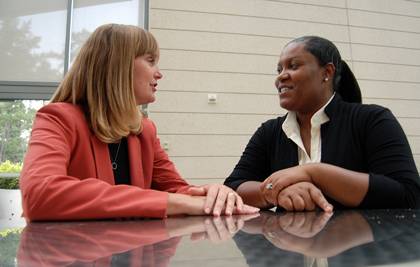Career Tools: Informational Interviews
Dining employee explores career path by interviewing other Duke staff

As Wanda Hall prepared and packaged salads, entrees and desserts for a commencement banquet at Duke, she found herself wondering what it takes to plan big special events.
Hall, a food service staff member at Duke for four years, wanted to learn more about budgeting, menu selection and decision-making.
Read More"I thought event planning might be something I'd like to do, but I didn't know how to find out more," Hall said.Her supervisors recommended she apply for the Professional Development Institute's Office Staff Development Program as a way to expand her career options at Duke. Hall was accepted into the program in January 2011, and as part of her professional development, she was introduced to the concept of informational interviews.
Informational interviews allow individuals to explore different careers without the pressure of trying to land a job. Employees interested in informational interviews can learn more about them on the Human Resources Professional Development Institute (PDI) website. PDI staff can assist in helping locate appropriate Duke employees for interviews.
"Informational interviews are a way to have your career goals confirmed - or not - and in the process, to expand your professional network," said Kelly Cottrell, a professional development specialist with PDI.
Through PDI, Hall got connected with Laura Grisham, director of events for the Law School. On the day of her first informational interview, Hall arrived 15 minutes early and waited nervously outside Grisham's office. Grisham greeted her with a warm, welcoming handshake.
"Relax," Grisham told her. "This is not a job interview."
As they settled in Grisham's office, Hall took a deep, calming breath. Then she began to work through questions to help her determine whether it was a good idea to shift careers from cooking to event planning.
What skills should every event planner have, she asked. Grisham suggested a creative spirit and work habits that don't include procrastination. How about the pros and cons of becoming an event planner? Grisham shared the reward she gets from organizing a smooth-running event. As for cons, she discussed the challenges of work/life balance when the job includes late night events.
"I didn't sugar coat anything," Grisham said. "I gave Wanda the nuts and bolts of the job here at the Law School, and advised her to look closely at administrative assistant positions, since that's where a lot of event planners get their start."
Hall also met with event planners from the Duke Clinical Research Institute, Mary Lou Williams Center for Black Culture and the School of Engineering. She came away with an appreciation for the skills and originality needed in event management, as well as how to work within a budget.
"They all told me you don't have to have a big budget to put on something big," Hall said. "You just have to be really creative."
Hall is uncertain whether event planning will supplant her passion for cooking, but she's determined to keep asking questions to find her way. She has found informational interviews so useful that she organized a fifth interview with a special events coordinator her sister knows.
"I'm still nervous, meeting someone for an interview," Hall said. "But I learn something new each time."